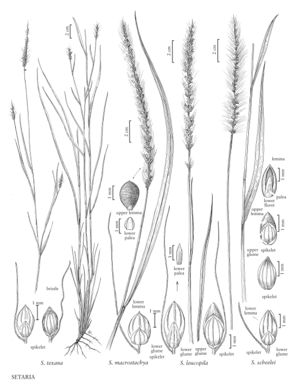Difference between revisions of "Setaria leucopila"
FNA>Volume Importer |
imported>Volume Importer |
||
| (5 intermediate revisions by 2 users not shown) | |||
| Line 26: | Line 26: | ||
-->{{#Taxon: | -->{{#Taxon: | ||
name=Setaria leucopila | name=Setaria leucopila | ||
| − | |||
|authority=(Scribn. & Merr.) K. Schum. | |authority=(Scribn. & Merr.) K. Schum. | ||
|rank=species | |rank=species | ||
| Line 33: | Line 32: | ||
|basionyms= | |basionyms= | ||
|family=Poaceae | |family=Poaceae | ||
| + | |illustrator=Linda A. Vorobik;Annaliese Miller | ||
| + | |illustration copyright=Utah State University | ||
|distribution=Okla.;N.Mex.;Tex.;Colo.;Ariz.;Ark.;Fla. | |distribution=Okla.;N.Mex.;Tex.;Colo.;Ariz.;Ark.;Fla. | ||
|reference=None | |reference=None | ||
| Line 38: | Line 39: | ||
|publication year= | |publication year= | ||
|special status= | |special status= | ||
| − | |source xml=https:// | + | |source xml=https://bitbucket.org/aafc-mbb/fna-data-curation/src/200273ad09963decb8fc72550212de541d86569d/coarse_grained_fna_xml/V25/V25_1403.xml |
|subfamily=Poaceae subfam. Panicoideae | |subfamily=Poaceae subfam. Panicoideae | ||
|tribe=Poaceae tribe Paniceae | |tribe=Poaceae tribe Paniceae | ||
Latest revision as of 17:56, 11 May 2021
Plants perennial; cespitose. Culms 20-100 cm. Sheaths compressed, glabrous, margins villous distally; ligules 1-2.5 mm, ciliate; blades 8-25 cm long, 2-5 mm wide, flat or folded, scabrous on both surfaces. Panicles 6-15 cm, tightly spikelike, pale green; rachises scabrous or villous; bristles usually solitary, 4-15 mm, ascending. Spikelets 2.2-2.8(3) mm, elliptical. Lower glumes about 1/2 as long as the spikelets, 3-veined; upper glumes from 3/4 as long as to equaling the florets, 5-veined; lower lemmas equaling the upper lemmas, 5-veined; lower paleas 1/2 - 3/4 as long as the upper paleas, lanceolate; upper lemmas apiculate, finely and transversely rugose; upper paleas similar. 2n = 54, 68, 72.
Distribution
Okla., N.Mex., Tex., Colo., Ariz., Ark., Fla.
Discussion
Setaria leucopila grows in the southwestern United States and northern Mexico. It is the most common of the perennial "Plains bristlegrasses."
Selected References
None.
